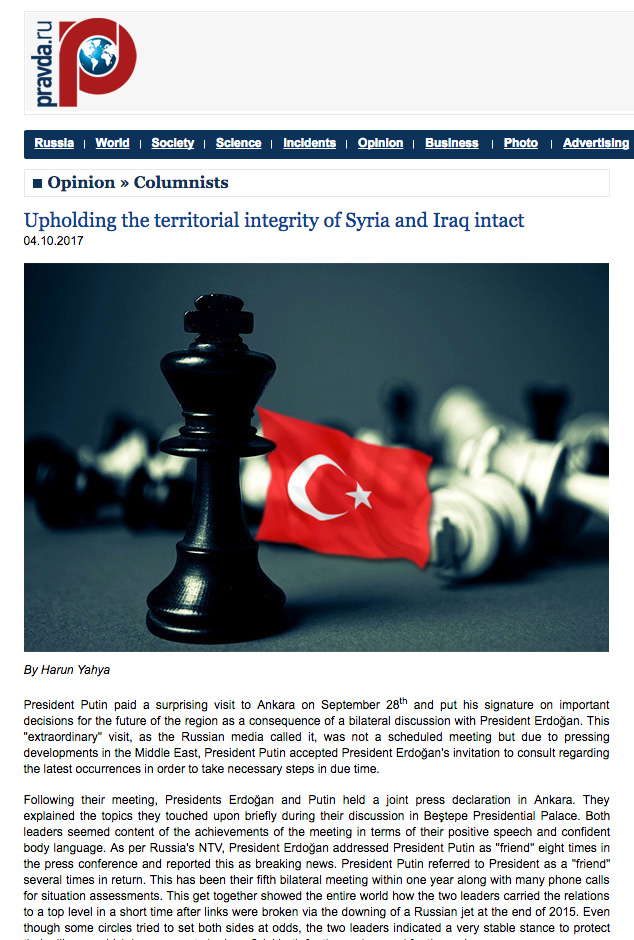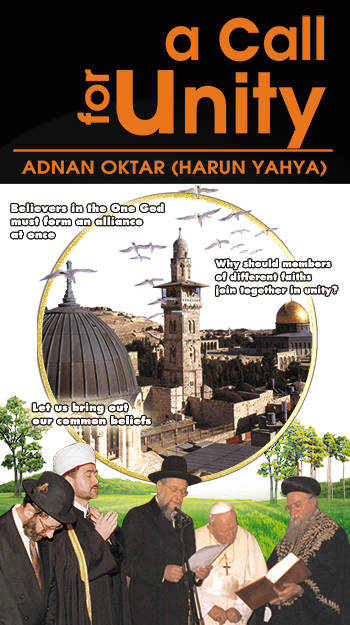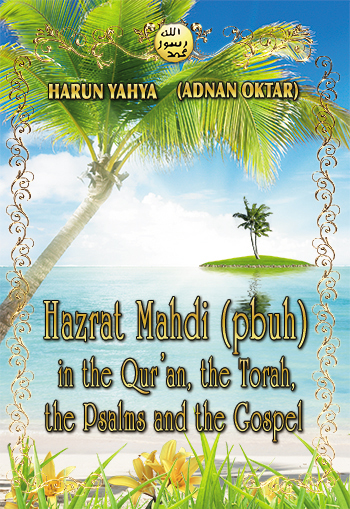Bigotry: The Dark Danger
Upholding the territorial integrity of Syria and Iraq intact

President Putin paid a surprising visit to Ankara on September 28th and put his signature on important decisions for the future of the region as a consequence of a bilateral discussion with President Erdoğan. This "extraordinary" visit, as the Russian media called it, was not a scheduled meeting but due to pressing developments in the Middle East, President Putin accepted President Erdoğan's invitation to consult regarding the latest occurrences in order to take necessary steps in due time.
Following their meeting, Presidents Erdoğan and Putin held a joint press declaration in Ankara. They explained the topics they touched upon briefly during their discussion in Beştepe Presidential Palace. Both leaders seemed content of the achievements of the meeting in terms of their positive speech and confident body language. As per Russia's NTV, President Erdoğan addressed President Putin as "friend" eight times in the press conference and reported this as breaking news. President Putin referred to President as a "friend" several times in return. This has been their fifth bilateral meeting within one year along with many phone calls for situation assessments. This get together showed the entire world how the two leaders carried the relations to a top level in a short time after links were broken via the downing of a Russian jet at the end of 2015. Even though some circles tried to set both sides at odds, the two leaders indicated a very stable stance to protect their alliance, which has proven to be beneficial both for themselves and for the region.
One of the main products of their partnership is the Astana talks. In December 2016, they agreed to propose Astana, as a new venue to carry on the Syrian peace talks as a complement Geneva. Despite being on opposite sides of the Syrian War, along with Iran they have become the means to a road to peace. In the sixth round of Astana talks in the middle of September, the three agreed to add a fourth region to the de-escalation zones: Idlib. The Foreign Minister made a written statement concerning the aim of forming this zone by saying that the observers' mission will be to prevent clashes between "the regime and the opposition forces, and any violations of the truce". Creating the fourth de-escalation zone is particularly important in the eyes of the affiliated countries due to various factors. First of all, Idlib, which has a border with Turkey, is home to many armed radical groups, including ones transferred from Aleppo.
As per the agreement in Astana, the armed radical groups are to be contained in a region in the middle of Idlib, which would prevent them from advancing to the Turkish border. While the Russian troops and Chechen leader Kadyrov's police forces will be deployed in the eastern part of Idlib, Turkish troops will be stationed in the western parts to sustain stability in the province. Since the contract calls for "rapid, safe and unhindered humanitarian access", international humanitarian aid will continue to be delivered via to the estimated 2.5 million people who inhabit the four de-escalation zones.
The leaders proved their determination in upholding the unitary structure of Syria through Astana Talks. With regards to Barzani's referendum, which was deemed illegal both according to the Iraq Central Government constitution and international law, both came to terms on keeping intact the territorial integrity of Iraq. Even though Baghdad, Ankara, Tehran governments had called on Barzani to cancel the polls, Barzani insisted and went to the polls ignoring these proposals. Following the illegal referendum, his neighbors Turkey, Iraq and Iran took some steps such as international flight embargo to Erbil, imposing sanctions and closing some borders. Moreover, Turkey and Iraqi troops have been carrying out a joint military exercise at the border of Northern Iraq. Turkey has agreed to cooperate strategically with Iran and Iraq against the KRG. Additionally, Russian company Gazprom halted its oil exploration process in Northern Iraq and Gazprom Neft Middle East President Sergey Petrov stated they would hold off on opening the Halabja oilfield. In Western media, an analysis showed that one of the aims behind the KRG's poll was to put Iran into the crosshairs by referring to Kurds of Iran are calling for independence just like the Kurds of Iraq.
Barzani could have chosen a diplomatic way to solve his issues with the central government. As there is a grave threat of the communist terrorist organization PKK planning to establish a communist state within the borders of Iran, Iraq and Syria, this move of Barzani's would put the entire region into fire. The PKK could easily take over an independent Kurdish state in Iraq through a coup and declare a communist state covering the region which would cause the death of thousands of innocent people. The people of the region have suffered enough and while the region is striving to settle down with the help of Turkey, Russia and Iran, Barzani's independence plan is the last thing the region needs.
Another important topic which has been in the international media is Turkey's purchase of S-400 missiles from Russia. This military truce has concerned the US and other Western countries since it is considered as Turkey, which is also a NATO member, being alienated from the West and shifting towards Russia. However, Foreign Ministry spokeswoman Agnes Romatet-Espagne said, "The purchase of military equipment by Turkey is a sovereign choice which does not need to be commented (upon) by members of the Atlantic alliance." While some Western analysts interpret this decision as a political decision as well as a military one, it is crucial to Turkey which has been under a threat by some circles as one can see by the bloody coup attempt on July 15thlast year. The rapid negotiation process, which lasted for approximately 10 months was pleasing to Russia, as well. Now Turkey, which has made the advance payment, is willing to have S-400 missiles at the soonest time to defend their country from regional threats. These will serve as a deterrent against those who want to break up Turkey and will repel their attacks.
According to President Erdoğan, trade and the economy are the backbone of Turkey-Russia relations. The volume of trade increased at a considerable amount in 2017 as a recovery of the fall of the previous year. For example, the agricultural trade rose 58.7% and both leaders agreed to overcome the obstacles they encounter in this regard. Regarding the energy agreements, President Erdoğan announced that the Turkish Stream and Akkuyu Nuclear Power Plant projects are on track and committed to solve all the issues Russia put forth concerning these energy projects. All the affiliated ministries from both sides will cooperate to accelerate the current projects and work on developing new ones.
The region needs the alliance of Turkey and Russia along with Iran. This league proved their strength and determination by taking solid steps to attain peace in Syria, preventing possible attacks against Qatar and now it is striving to halt unrest in Iraq. There are a lot of people behind closed doors who seek to gain benefits by covertly planning new clashes in the Middle East. Only this union can put an end to this bloody strife if they continue to act like well-built walls.
Adnan Oktar's piece in Pravda (Russia):
http://www.pravdareport.com/opinion/columnists/04-10-2017/138834-syria_iraq-0/
2017-10-05 01:41:25







